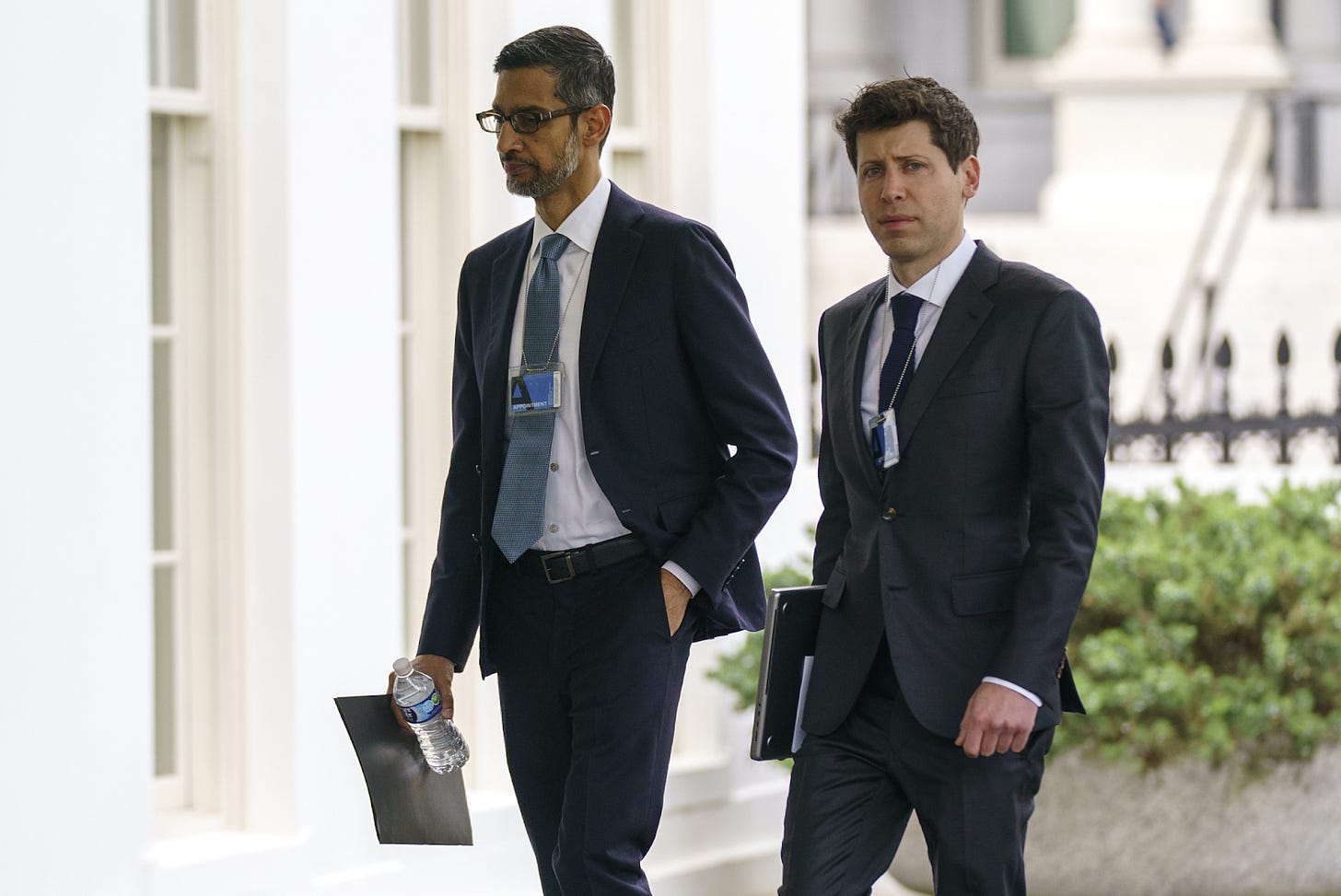Dystopia.
the most high profile boardroom coup since Steve Jobs got fired from Apple. Part 2.
Previously:
Bill Gates is responsible for OpenAI’s biggest breakthrough.
In June 2022, the OpenAI team gave Microsoft execs a demo of GPT-4, and Bill Gates, once again, was unimpressed by the lack of progress from GPT-2.
He told the team to call him back when GPT-4 was able to score a 5 on an AP Biology exam. Gates’ reasoning was that AP Biology tested critical thinking as opposed to rote memorization, and critical thinking is needed in order to build a foundation for agents that could do deeper research than humans.
So Greg Brockman made a call to Sal Khan, CEO of Khan Academy, to use the company’s trove of AP Biology questions for training data. Khan proposed a quid pro quo: his company would get access to the model in exchange for their data. With the fresh data on deck, Brockman assembled a special team to cook up a new user interface to impress Bill Gates.
Two months later, Altman and Brockman pulled up to Bill Gates’ house with another GPT-4 demo.
The climax of the presentation was GPT-4 correctly answering 59 out of 60 multiple choice questions.
Gates said the demo was one of the two most exciting demos he’d ever seen.
OpenAI’s team was awestruck, and the momentum carried them directly into the ChatGPT launch.
At first, the executive team planned to release GPT-4 in 2023.
But in October, rumors began to spread that Anthropic, the startup founded by ex-OpenAI executive Dario Amodei, was going to drop their chatbot soon.
These hearsay rumors put a battery in the back of OpenAI’s leaders.
Instead of plugging GPT-4 into a chatbot, they opted to use GPT-3.5 in order to be first to market.
ChatGPT was meant to be a preview of OpenAI’s research capabilities, not a full blown product launch. No plans for monetization were in place.
On November 30, 2022, ChatGPT was released to the world.
ChatGPT crossed 1M users in five days
ChatGPT crossed 100M users in two months
Fastest growing consumer app in history
People who have worked closely with Sam Altman describe him as a mirror.
He reflects the person he’s dealing with to garner influence and power.
One OpenAI employee claimed it was impossible to know what Altman truly believed.
The same allegations of pathological dishonesty followed Sam from Loopt to OpenAI.
When Altman was trying to convince Musk to partner on the project in earlier days, he expressed a similar fear of Google using AI to induce worldwide dystopia. Which worked, because he reflected Elon’s fear of Hassibis and Google.
When Musk left, Altman’s views flipped to reflect a much less drastic outlook.
In October 2023, Mira Murati talked to Helen Toner, an OpenAI board member, about Altman’s behavior.
Mira was OpenAI’s Chief Technology Officer at the time. She previously worked as a senior product manager at Tesla, before joining a company named Leap Motion, and finally landing at OpenAI in 2018. She climbed the ladder from VP of Applied and Partnerships to CTO.
As CTO, she spent a large portion of her time cleaning up the damage Altman left behind.
You see, OpenAI had an organizational leadership issue.
If two teams or people disagreed on something, Altman would meet with each team individually and agree with both of them, which created more confusion. To make matters worse, Brockman, the President, was basically a second CEO that had a separate agenda, and employees were unsure of which direction to follow. Lastly, Microsoft CEO Satya Nadella acted as the ultimate boss; Altman had a tendency to switch plans altogether after receiving instructions from his primary source of funds.
Mira was the fixer that provided organizational clarity when employees needed it most.
As competition grew between LLM companies, Altman started pushing the company for faster output without undergoing proper safety checks. In one glaring case, he told Murati that he thought OpenAI’s legal team cleared GPT-4 Turbo for skipping DSB review. But Murati checked with the legal team head, Jason, and he said that was never communicated to Altman.
Tensions were rising.
On the surface, however, things looked great.
The LLM business was dominating venture capital funding.
OpenAI raised $10B from Microsoft early in 2023 at a $30B valuation, and was in the process of closing an employee tender offer (secondary sale) led by Thrive Capital that valued the company at $80B+.
Anthropic raised a combined $4B from Google, Amazon, Salesforce and Spark Capital in 2023 at a $30B valuation.
Cohere raised a $270M Series C from Inovia, NVIDIA, Oracle, Index, and Salesforce, at a $2.2B valuation.
Even Europe got in on the action - France based Mistral AI raised a $113M seed round at a $240M valuation, qualifying for the title of “Europe’s largest seed round”.
Across the investing landscape, whispers of an AI bubble floated around. The numbers were too loud.
Josh Kushner didn’t care about expensive valuations.
His bullishness transcended rational price talk.
Kushner’s relationship with Altman stretches back to 2011, when Kushner was a 26 year old with limited formal investing experience getting ready to launch Thrive Capital. Altman was advising companies at Y-Combinator, and the two talked briefly about their investing goals.
Kushner’s first fund in late 2009 was a $5M vehicle anchored by his parents.
His most recent one in mid 2024 was a $5B vehicle across venture capital and growth strategies.
Fund I: $5M (2009)
Fund II: $40M (2011)
Fund III: $150M (2012)
Fund IV: $400M (2014)
Fund V: $700M (2016)
Fund VI: $1B (2018)
Fund VII: $2B (2021)
Fund VIII: $3.3B (2022)
Fund IX: $5B (2024)
Over time, Thrive’s LP base began to look like U.S. News college rankings: Princeton, Stanford, and Yale were a few of the big-time backers supplying Kushner with dry powder.
The key to unlocking endowment capital can be found in Kushner’s relationship with Andrew Golden, the CEO of Princeton’s endowment, who once said Kushner reminded him of his son. Golden’s mentorship and introductions were fundamental to scaling Thrive’s capital formation from 0 to 1. The Thrive Capital playbook across hiring, investing / incubating, and capital formation is interesting enough to warrant a separate series.
In 2022, when Altman was considering launching ChatGPT, Kushner was the first venture capitalist he called. They met at a closed door event in Arizona and went for a stroll outside. Altman started rambling about the dangers of investing in OpenAI: Microsoft had a complicated relationship with their startup and things could get shaky down the line, it also wasn’t clear if the tech they were building would become a commodity in the near future, building the tech was extraordinarily capital intensive - it cost less to build rockets at SpaceX. Kushner listened closely and thought through what Sam was saying.
Kushner decided that artificial intelligence was too important not to swing at, and OpenAI was the best team in the field. The valuation would look crazy now, but ten years from now, the investors who scoffed at the valuation would look crazy. Kushner called OpenAI “the most consequential investment of my lifetime.”
Over the course of 2023, Thrive Capital invested upwards of $300M into OpenAI.
A notable difference between LLMs in the past few years and the dot-com boom is the level of corporate investment - Microsoft, Google, NVIDIA, Oracle, Meta - in the LLM arms race. The largest tech players have unparalleled amounts of cash to spend, and they are willing to spend as much of it as possible to position themselves as winners if AI turns out to be revolutionary. If AI flops, then it was just a rounding error - life goes on. It’s the modern technology equivalent of Pascal’s Wager. The importance of corporate participation cannot be understated - big tech has priced most venture capital funds out of the equation. Investing in a foundational AI company at a $50B valuation is hard to justify when you consider the type of exit needed to return a decent multiple.
Corporate investment combined with larger-than-ever growth equity funds and a real need for increased infrastructure to power better models led to the wonky fundraising headlines that often don’t add up.
Which meant that OpenAI employees were overnight millionaires in 2023.
That didn’t help Murati sleep better; she couldn’t be paid enough to deal with Sam.
Her meeting with Helen Toner was a chance to take action.
Is there anything the board should know about?
Murati thought about the question carefully, cautious about how she was going to articulate her frustrations.
As the conversation went on, Murati confided more in Toner, eventually getting comfortable enough to spill the earl grey on Altman’s manipulative behaviors.
Toner’s feelings about Altman were confirmed.
Afterwards, Toner talked to Ilya Sutskever and got additional intel on not just Altman, but also Greg Brockman, his number two.
The trickiest thing about Altman’s leadership playbook was that he never crashed out. There was no single large incident to point to as evidence of wickedness. Everything was subtle: small lies were his signature move, evading expulsion was a game he never lost at.
Toner rallied the troops.
As she met with board members on October 31st, a list of grievances was made.
Sam failed to disclose his legal ownership of the OpenAI startup fund.
Sam failed to mention Microsoft’s DSB breach to OpenAI leaders.
Sam tried to force out two board members using Machiavellian tactics.
Should the future of AGI lie in the hands of Sam?
His value-add outside of fundraising was suspicious; the group concluded that Murati did the heavy lifting organizationally and Sutskever owned the technical intricacies.
What wasn’t mentioned, however, is Sam’s relationship with Microsoft. The independent directors believed that Murati had a strong relationship with Microsoft.
On November 11th 2023, the board made a decision to remove Altman and allow Murati to assume the title of interim CEO.
On November 17th 2023, OpenAI announced Sam’s firing to the public.
What took place afterwards will become an MBA case study in organizational leadership dynamics.
Sutskever and Murati held a virtual town hall to answer questions from OpenAI employees.
Questions like “was there a specific incident that led to this” and “how does this affect the relationship with Microsoft” were met with unsatisfying, vague answers.
Employees were not happy.
They started to gather after work and plot ways to overthrow their new bosses.
Some contacted Altman and let him know that they would go where he went.
Some left to start their own startups while the iron was still hot.
Three senior researchers, Jakub Pachocki, Szymon Sidor, and Aleksander Madry, quit in the middle of the crisis.
Meanwhile, Brad Lightcap, OpenAI COO, started talking to investors. His first call was Josh Kushner from Thrive Capital.
According to Lightcap, Kushner was eerily calm about the entire situation, focusing on how Lightcap felt rather than panicking about the potential for lost shareholder value. Lightcap began communicating with Kushner around the clock, rewarding him for his cool demeanor and support.
One by one, Microsoft and other key investors publicly sided with Altman.
The board had sloppily miscalculated the influence Sam had with his investor base.
Even Murati began to second guess whether she really wanted the CEO title.
On Sunday, November 19th, Satya Nadella announced that he would hire Altman and Brockman to lead a new AI division at Microsoft.
At the end of the day, Altman had too much power with the constituents that mattered most.
Most employees loved him. His biggest check writer loved him.
The executives and board members who despised him were outnumbered. If Microsoft was with him, and employees lost faith in the mission without him, it would be impossible to pull off a proper coup.
If you strike, kill. Do not wound.
Sun Tzu, The Art of War (5th century BC)
Men ought to be well treated or crushed, because they can avenge themselves of lighter injuries, of more serious ones they cannot.
Machiavelli, The Prince (1513)
If you come at the king, you best not miss.
Omar Little, The Wire (2002)
Sam Altman was reinstated as CEO of OpenAI. Toner and McCauley, two board members that led the attack, were pushed out. Brockman was back.
Life went on.
Some battles leave permanent damage, even after time stops the bleeding.
Trust between Sutskever / Murati and Altman / Brockman never recovered.
In May 2024, Ilya announced he was leaving OpenAI.
He would go on to start Safe Superintelligence (SSI) and raise roughly $1B over the course of 2024 and an additional $2B this year, at a reported $32B valuation.
In July 2024, Mira announced she was leaving OpenAI.
This summer, it was reported that Mira Murati raised $2B at a $10B valuation for Thinking Machines Lab, her new AI startup. According to the Financial Times, an investor who passed on the deal said Murati’s pitch offered no information about a product or business plan. She was also given a board vote equal to all other votes combined plus one.
2025 has been an incredible fundraising year for foundational AI companies.
OpenAI’s most recent valuation was a reported $500B, which sounds suspicious considering Softbank’s involvement, funding commitments that are contingent on shedding the non-profit structure, as well as other outrageous numbers being thrown around by the OpenAI camp.
But investor demand at that price point is very real.
Caplight is a fintech platform for secondary market data on pre-IPO and private company stock. It gives institutional investors similar transparency, execution, and settlement features that exist in public markets. Backed by Better Tomorrow Ventures, Susquehanna, Clocktower, and others, Caplight has amassed several hundred billion dollars in aggregated secondary market transaction data.
Javier Avalos, CEO of Caplight, told us, “We have seen almost all buy interest and little sell interest on the foundational model companies.”
In other words, the price is continuing to see plenty of demand from ultra high net worth individuals, asset managers like mutual funds and hedge funds, and later stage venture funds.
Demand for OpenAI secondaries currently implies a $521B valuation, an even higher mark than the reported $500B valuation that SoftBank bought into.
Anthropic secondaries have seen the steepest price growth during the past six months, as investors see upside in a much lower $200B valuation. On the go-to-market side, Anthropic has done a great job of focusing on enterprise customers, but OpenAI’s chokehold on the consumer AI market will be tough to beat.
It’s easy to wince at a $500B+ price tag for a private company that did $4.3B in the first half of 2025. Especially considering how competitive the LLM field is - from startups like Anthropic and xAI to established incumbents like Meta and Google.
But investing is not a purely rational sport, because business is not purely rational, because humans are not purely rational.
OpenAI’s technology does not need to reach PhD level intelligence to be highly impactful economically. It just needs to be first rate, not too far behind Google or Anthropic. OpenAI’s ChatGPT moment won the consumer. The next few years will be capitalizing on that moment through an ecosystem of new products, much like Apple did in the early to mid 2000’s. The demographic that cares deeply about which large language model has superior technical capabilities is too small to move the needle. 700 million people use ChatGPT weekly. That’s everyone in the U.S. multiplied by 2.
ChatGPT is used by men, women, and children all the way from midtown Manhattan to the slums of Mogadishu.
Investors are envisioning OpenAI as the next Apple.
This is what OpenAI’s backers are underwriting, not trailing twelve months revenue.
By no means is that a sure bet. A million things could go wrong, and it is still far more likely that OpenAI falls short.
Structural profitability remains a direct challenge as costs continue to skyrocket due to the expensive nature of infrastructure.
Google has the headstart with DeepMind, a data advantage, and Demis Hassibis is still orchestrating strategic moves as the CEO of DeepMind.
Talent retention is another issue, all of the organization’s most intense technical minds have left to start their own companies - Dario Amodei (Anthropic), Ilya Sutskever (SSI), Mira Murati (Thinking Machines Lab) - and even entry level researchers leave each week to launch startups that venture capitalists gobble up with a violent gluttony.
Controversy continues to cloak OpenAI - from data privacy concerns to more serious allegations, the media is no longer treating Altman and Co. as newcomers. They are now getting the Big Tech special.
the story continues in real time









